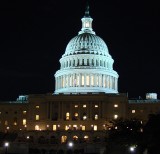
Protecting Consumers

Top 400 Taxpayers See Tax Rates Rise, But There’s More to the Story
As Americans were gathering party supplies to greet the New Year, the Internal Revenue Service released their annual report of cumulative tax data reported on the 400 tax r...
read in full
Chlorine Bleach Plants Needlessly Endanger 63 Million Americans
Chlorine bleach plants across the U.S. put millions of Americans in danger of a chlorine gas release, a substance so toxic it has been used as a chemical weapon. Greenpeace’s new repo...
read in full
U.S. Industrial Facilities Reported Fewer Toxic Releases in 2014
The Toxics Release Inventory (TRI) data for 2014 is now available. The good news: total toxic releases by reporting facilities decreased by nearly six percent from 2013 levels. Howe...
read in full
Methane Causes Climate Change. Here's How the President Plans to Cut Emissions by 40-45 Percent.
UPDATE (Jan. 22, 2016): Today, the Bureau of Land Management (BLM) released its proposed rule to reduce methane emissions...
read in full
Living in the Shadow of Danger: Poverty, Race, and Unequal Chemical Facility Hazards
People of color and people living in poverty, especially poor children of color, are significantly more likely...
read in full
A Tale of Two Retirements: One for CEOs and One for the Rest of Us
The 100 largest CEO retirement funds are worth a combined $4.9 billion, equal to the entire retirement account savings of 41 percent of American fam...
read in full
Gasping for Support: Implementation of Tougher Air Quality Standards Will Require New Funds for State Agencies
New scientific research shows that the current levels of...
read in full



 The Small Business Administration (SBA) is supposed to protect the interests of small businesses – businesses most Americans define as employing fewer than 100 workers. But a little-known office in the SBA, the Office of Advocacy, has recently weighed in with the National Toxicology Program (NTP), urging that it scrap a congressionally mandated Report on Carcinogens and challenging NTP’s designation of formaldehyde as a known human carcinogen. The NTP report is not a regulatory document. It does not directly affect small business costs. So what is the Office of Advocacy at the SBA doing objecting to a scientific report on carcinogens?
The Small Business Administration (SBA) is supposed to protect the interests of small businesses – businesses most Americans define as employing fewer than 100 workers. But a little-known office in the SBA, the Office of Advocacy, has recently weighed in with the National Toxicology Program (NTP), urging that it scrap a congressionally mandated Report on Carcinogens and challenging NTP’s designation of formaldehyde as a known human carcinogen. The NTP report is not a regulatory document. It does not directly affect small business costs. So what is the Office of Advocacy at the SBA doing objecting to a scientific report on carcinogens?


 Although the nation's premier consumer product regulator, the Consumer Product Safety Commission (CPSC), has been crippled by budget cuts and staffing losses in the past, it has seen increases in its resources and responsibilities since 2008. However, advocates argue that a much larger influx is required to ensure that the CPSC has the resources it needs to protect Americans and eliminate dangerous products from the marketplace.
Although the nation's premier consumer product regulator, the Consumer Product Safety Commission (CPSC), has been crippled by budget cuts and staffing losses in the past, it has seen increases in its resources and responsibilities since 2008. However, advocates argue that a much larger influx is required to ensure that the CPSC has the resources it needs to protect Americans and eliminate dangerous products from the marketplace. The so-called Regulatory Freeze for Jobs Act,
The so-called Regulatory Freeze for Jobs Act,  The U.S. Environmental Protection Agency (EPA) is reviewing the Consumer Confidence Report (CCR) rule, a policy mandating that public water systems provide annual reports to consumers on the quality of local drinking water. The resulting reports have been criticized for being overly technical, complex, and difficult for the general public to understand or act upon.
The U.S. Environmental Protection Agency (EPA) is reviewing the Consumer Confidence Report (CCR) rule, a policy mandating that public water systems provide annual reports to consumers on the quality of local drinking water. The resulting reports have been criticized for being overly technical, complex, and difficult for the general public to understand or act upon.




